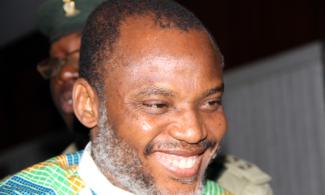
A Federal High Court in Abuja has fixed Friday, January 29 for its ruling on the bail application brought by the embattled leader of the Indigenous People of Biafra, IPOB, and founder of Radio Biafra, Nnamdi Kanu who was charged for treason alongside two others.
A Federal High Court in Abuja has fixed Friday, January 29 for its ruling on the bail application brought by the embattled leader of the Indigenous People of Biafra, IPOB, and founder of Radio Biafra, Nnamdi Kanu who was charged for treason alongside two others.
[slideshow]44731[/slideshow]
On Monday, the arguments for Mr. Kanu’s bail application were taken. The Prosecution counsel, Mohammed Diri, argued that the bail application put up by the defence counsel does not satisfy the requirement of the Evidence Act.
He noted that the court should consider the weighty evidence against the accused, such as Mr. Kanu’s a statement admitting that he was a British citizen, that he sneaked into the country without an international passport, and that he was the operator of Radio Biafra operating in London. Mr. Diri, therefore, urged the court to refuse and trash the application.
The Defence counsel, M.U. Udechukwu objected to the Prosecution counsel’s submission of evidence. Mr. Udechukwu informed the court that the document being cited by the prosecution had not been admitted as evidence by the court and, therefore, the prosecution had no right before to reference the documents.
He argued that there are procedures for the submission of such documentation before it can be admitted as an exhibit. He, therefore, called on the court to grant the defendant’s request for bail on the grounds that the offence committed was not a capital offence.
Justice James Tsoho informed both of the counsels that the ruling on the bail application will be decided on Friday.
A mild drama ensued at the court premises when Mr. Kanu was brought in handcuffed, but refused to come out of the prison vehicle because of the press cameras.
Two other suspects were arraigned along with him came down and were seen in cuffs. The situation caused the prison guards to look for an alternative entrance to the court. Eventually, they ushered into the court Mr. Kanu through an elevator reserved for the judges.
Immediately after the court adjourned the case, Mr. Kanu was seen exchanging greetings with friends and relatives when the prison officials asked him to move toward the elevator. However, he appeared reluctant to do so and pointed warning fingers at the prison officials daring them to hurt him. The situation nearly lead to fisticuffs before it was brought under control, and he was led into the prison vehicle.
Mr. Kanu is standing trial for a six-count charge against him by the Federal Government of Nigeria.